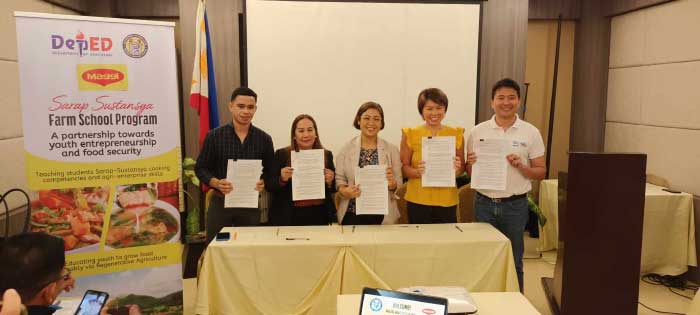
By Joseph Bernard A. Marzan
The Department of Education (DepEd)-6 officials on Tuesday inked an agreement with a global food and flavoring brand that is seen to increase support to 27 farm schools across Western Visayas.
Under the agreement, Maggi, a food and flavoring brand under Nestlé, will provide a ‘three-pronged support’ under its Sarap Sustansya Farm School Program.
The program includes training and learning materials on Sarap Sustansya cooking, regenerative farming, and entrepreneurial skills, as well as farming tools and implements that will assist faculty and students with their school farms and vegetable gardens.
Teachers are expected to instruct students on determining adequate portions based on the Food and Nutrition Research Institute’s (FNRI) Pinggang Pinoy recommendations for a balanced plate, and how to plan a menu from a range of ingredients for a more nutritionally complete and affordable diet, under the Sarap Sustansya Kusinaskwela modules.
Learners are expected to pick up on regenerative farming method, which focuses on ensuring the health of the soil and waterways, biodiversity, and increasing resilience to climate change, with practices including as composting, multi-cropping or intercropping, and use of cover crops.
Experts from Maggi and Nestlé will help teachers and students maximize their potential under the program.
DepEd-6 Field Technical Asisstance Division officer-in-charge Mayleen Joy Fariñas touted the partnership to unlock greater opportunities for farm school stakeholders.
“Today we are about to embark on another dimension of adding more value to the harvest of our learners. Our learners will have more appreciation of their harvest because it will not remain as vegetables that they can sell but it will be converted into value-added products with this training through our teachers,” Fariñas said in her message.
In a press release, Nestlé Philippines Senior Vice President and Business Executive Officer – Food and Dairy Culinary Rosalyn Simba said that the partnership would indicate Maggi’s commitment to a food-secure future.
“We are thrilled that the MAGGI Sarap Sustansya advocacy is very much aligned with DepEd Farm
School’s thrust to promote food sufficiency and good eating habits, while cultivating an entrepreneurial mindset among the youth. MAGGI is committed to work with partners like DepEd in achieving a food-secure future, where families and communities have better access to fresh ingredients, and benefit from delicious meals that are vegetable-rich and affordable,” said Simba.
Around 3,000 learners from the following schools are expected to benefit from the partnership:
- Pinamuk-an Integrated Farm School (Aklan);
- Aningalan Integrated Farm School (Antique);
- Alangilan Farm School (Bacolod City);
- Sum-ag Farm School (Bacolod City);
- Ramon Torres Malingin Farm School (Bago City, Negros Occidental);
- Mabini Farm School (Cadiz City, Negros Occidental);
- Ishmael B. Orillos Farm School (Capiz);
- Roxas Farm School (Capiz);
- Floro T. Bongco Farm School (Escalante City, Negros Occidental);
- Catalino G. Nava Farm School (Guimaras);
- Mambagaton Farm School (Himamaylan City, Negros Occidental);
- Paloypoy Integrated Farm School (Himamaylan City, Negros Occidental);
- San Joaquin Farm School (Iloilo);
- Jayobo Farm School (Iloilo);
- Tiu Cho Teg-Ana Ros Foundation Integrated Farm School (Iloilo City)
- Tabugon Farm School (Kabankalan City, Negros Occidental);
- La Granja Farm School (La Carlota City, Negros Occidental);
- Cansilayan Farm School (Negros Occidental);
- Agdahon Farm School (Passi City, Iloilo)
- Loctugan Integrated Farm School (Roxas City);
- Sagay City Eco-Zone Farm School (Sagay City, Negros Occidental);
- Sagay City Farm School (Sagay City, Negros Occidental);
- Bulanon Farm School (Sagay City, Negros Occidental);
- Quezon Farm School (San Carlos City, Negros Occidental);
- Angeles J. Montinola Farm School (Silay City, Negros Occidental);
- Maricalum Farm School (Sipalay City, Negros Occidental); and
- Victorias City Farm School (Victorias City, Negros Occidental).
Western Visayas is one of the regions where farm schools were pioneered as part of the K-12 curriculum.
These schools were established under Republic Act No. 10618 (Rural Farm Schools Act), a 2013 law which mandates the presence of at least 1 farm school in every province in the country.





















